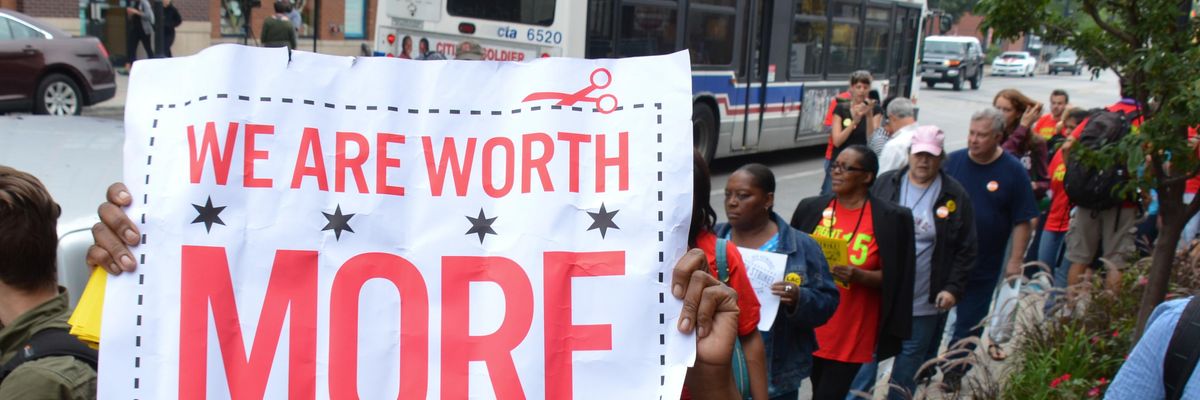A Sacramento judge ruled Friday that an initiative to raise California's minimum wage to $18 an hour by 2025 cannot appear on the state's ballot this coming November, even though the campaign behind the proposal obtained more than enough signatures.
Sacramento County Superior Court Judge James Arguelles' ruling stems from a dispute between the Living Wage Act campaign and the office of California's Democratic Secretary of State Shirley Weber, who said county officials didn't verify a sufficient number of signatures in time.
"The conservative tilt of one courtroom will not stop us from doing what is right for Californians. The people are on our side."
As Cal Mattersreported Friday, "The minimum wage campaign argued that Weber's office confused county election officials because she told them they had until July 13 to finish the count, based on the requirement that counties get 30 working days for signature verification after campaigns turn in their petitions."
"Proponents collected 1 million signatures, but didn't turn in signatures until May, Weber's office said, making them late to start the clock," the outlet explained. "By the June 30 deadline to qualify for this November's ballot, several counties had not finished verifying signatures and the campaign fell short."
The Living Wage Act campaign--whose lead backer, investor and anti-poverty activist Joe Sanberg, has characterized Weber's decision as "an honest mistake"--opted to sue the secretary of state in a last-ditch bid to get the initiative on the ballot in November.
But Arguelles ultimately sided with Weber's office and barred the popular proposal from the 2022 ballot after the California Restaurant Association and the California Business Roundtable--leading corporate lobbying groups in the state--pleaded with the judge to rule against the minimum wage proposition.
Campaigners pointed out Friday that Arguelles is the same judge who granted a months-long signature-gathering extension to proponents of a failed effort to recall California Gov. Gavin Newsom last year.
In June 2020, former President Donald Trump selected Arguelles to serve on the U.S. District Court for the Eastern District of California, but the Senate never advanced his nomination.
"Though he saw fit to offer right-wing extremists a three-month extension to recall our governor, he declined to give voters an opportunity to pass a measure that would lift working people out of poverty," Sanberg, U.S. Rep. Nanette Barragan (D-Calif.), and UNITE HERE Local 11 co-president Ada Briceno said in a joint statement Friday.
"This gross double standard is wildly unethical," they added. "But the conservative tilt of one courtroom will not stop us from doing what is right for Californians. The people are on our side. Raising the minimum wage is not a partisan issue--it is wildly popular among voters. Recent polling shows that more than two-thirds of voters support an $18 minimum wage."
The ballot initiative proposed incrementally lifting California's minimum wage to $18 an hour, starting with an increase to $16 next year.
California's minimum wage is currently $14 an hour for businesses with 25 or fewer employees and $15 an hour for businesses with 26 or more employees. MIT's Living Wage Calculator estimates that an adult with one child would have to make at least $44.18 an hour working full-time to meet essential needs in the state, where housing costs and other expenses are high and rising.
"Increasing the state's minimum wage to $18 would eliminate poverty among all the 3.53 million non-elderly Californians in poor working households."
According to an analysis by Michael Reich, an economist at the University of California at Berkeley, the Living Wage Act of 2022 (LWA) would have raised pay for roughly 4.8 million California workers by 2025 while having a "minimal effect on the number of jobs."
"The LWA would also restore inflation-generated losses in worker purchasing power caused by gaps in current laws, while increasing overall prices about 0.014 percent per year for three years," Reich found. "Equally important, increasing the state's minimum wage to $18 would eliminate poverty among all the 3.53 million non-elderly Californians in poor working households."
In their statement on Friday, Sanberg, Barragan, and Briceno lamented that "today, a Trump-nominated judge ruled against 5 million Californians."
While the initiative has formally qualified for the November 2024 ballot, the campaigners argued that "workers cannot wait another two years for a raise."
"They are barely earning enough to afford next month's rent," said Sanberg, Barragan, and Briceno. "As the cost of living in the Golden State continues to skyrocket, it is vitally important that our state leaders step up to the plate and fight for those Californians living on the bleeding edge of poverty."
"We move forward in the fight for a state where one job is enough to get by," they continued. "Tomorrow, we will begin pursuing alternative, legislative paths to pursue this essential increase to California's minimum wage. We encourage longtime supporters of working people, including Gov. Gavin Newsom, to join us as we accelerate our work to deliver on this moral imperative."
In a recent segment on The Hill's "Rising," journalist Ryan Grim outlined steps Newsom could take to get the minimum wage initiative on the ballot this November:

